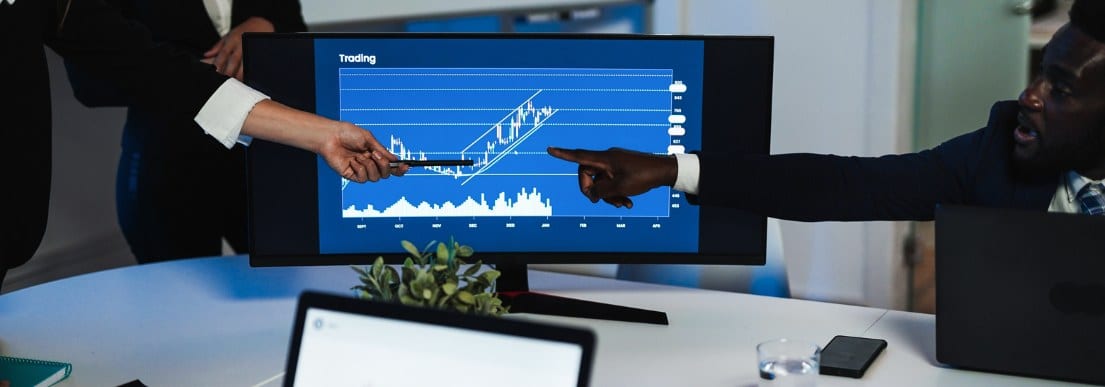- Home
- Forex News
- Transforming forex trading in South Africa: how information technology enhances earnings
Transforming forex trading in South Africa: how information technology enhances earnings

Information technology has transformed the forex trading market in South Africa, providing traders with a range of tools and services to assist them in making more informed decisions. Automatic algorithmic trading systems are now commonly employed by traders to evaluate exchange rates and execute rapid trades. In addition, electronic communication networks (ECNs) enable traders to access markets directly from their PCs or other devices, facilitating better comfort and swiftness while performing transactions.
Through the use of sophisticated software programs, traders can also easily analyze data such as price histories, trends, and news reports to gain valuable insights into the direction of currency movements. Furthermore, online brokers offer competitive fees on transactions that provide additional value for investors who trade regularly. Overall, information technology has revolutionized how South Africans engage in forex trading by providing users with an array of features designed to improve efficiency while lowering costs.
Access to Vital Information
The introduction of online trading platforms and choosing the right forex partner has also improved the trading process. Automated tools such as advanced charting and analysis capabilities, automated stop-loss orders, customizable software, and integrated leverage management have significantly increased a trader’s ability to make informed decisions quickly. Additionally, traders can access real-time market data through their internet-powered devices, which gives them an edge in making accurate predictions about currency movements.
The screener offers filters for fundamental and technical analysis, which is great for finding stock ideas. You can also save your search criteria as a template to use in the future. Ally Invest gives investors tools for trading, like advanced charts, price alerts, market scans, and live news. They offer an intuitive platform that makes trading easy and efficient. The broker also has options trading capabilities. Tickmill and HotForex are reliable forex trading platforms. Tickmill partners with top liquidity providers to offer clients the lowest spreads and risks. HotForex is regulated by the FSCA and other agencies and meets strict security standards. Hence, it is a reliable, legitimate, and trustworthy broker. HotForex offers CFDs, Forex, social, share, and spread betting.
The Trading Central (Recognia) Technical Insight feature on StreetSmart Edge helps the best forex brokers in South Africa interpret data quickly, compare stocks, and identify potential trading opportunities. Traders can use the latest market trends and technical signals with the help of this powerful set of technical analysis tools. The tool includes key chart patterns such as Head & Shoulders, Double Tops & Bottoms, Breakouts and Reversals, and moving averages that can help a trader stay ahead of price movements. Traders can also use Trading Central (Recognia) information to refine their trading strategies by adding parameters for monitoring performance or changing tactics depending on current conditions.
Many of the technical indicators available on charting platforms are incredibly powerful. Many traders use them to help identify trends, find potential entry and exit points, and manage risk. Moving averages can be used to identify long-term trends, while oscillators such as Stochastics or MACD can help pinpoint shorter-term reversals in price. Chart patterns like flags, wedges, and triangles also provide important trading signals that can alert investors to a possible buy or sell opportunity.
Understanding Automated Trading
Automatic systems monitor market conditions and execute trades. Stop loss strategies, limit orders, and trailing stops give traders more control over their trading. Forex robots can help inexperienced traders who lack the skills to trade manually. Automated systems allow skilled traders to swiftly react to market movements or execute complex strategies that would otherwise require a lot of manual intervention and analysis.
Automated trading systems can develop and execute transactions quickly. Algorithms allow computers to examine market data faster than humans. This enables quicker reaction times and reduces slippage in volatile markets. Algorithmic trading programs analyze technical indicators like moving averages, momentum oscillators, and volume figures to help traders make better selections.
Backtesting can also assist traders in finding and fixing strategy weaknesses before risking real money in the markets. Backtesting lets traders evaluate tactics and find the optimal one for any market. This approach eliminates emotion from trading because the rules are predetermined and followed. Backtesting helps traders evaluate their ideas and improve long-term success.
AI and ML can be used to develop new products, services, and processes that improve the customer experience. For example, AI can automate the process of validating documents and processing payments. Banks are already using ML algorithms to detect fraud faster by quickly analyzing large amounts of data. This reduces the number of false positives resulting in unnecessary customer delays.
In addition, automation also helps to reduce manual errors, which can increase operational costs and lead to customer dissatisfaction. In conclusion, increased automation, along with AI and ML, has great potential for improving trade finance’s efficiency while providing better customer experiences simultaneously. Banks should look into these technologies to reduce operational costs while increasing accuracy and speed in their trade finance operations.
Using Mobile Trading
Traders may now access the same real-time market data, charts, and news as on a desktop platform, with features tailored to their trading styles. Mobile trading offers enhanced portfolio management and order entry and execution right from the charting program. Many mobile platforms give price alerts for deals in progress, making it easier to track market movements wherever you are. Mobile trading is essential for portfolio managers who demand flexibility and convenience. Mobile traders can make educated decisions quickly and easily thanks to enhanced order types, analytic functions, customizable indicators, and price alert notifications.
Mobile trading platforms let users access their accounts anywhere with an internet connection. This lets them execute transactions in real-time, analyze market conditions, and seize chances. South African traders may make informed decisions with mobile trading apps. Due to its convenience and accessibility, more traders are using mobile trading apps to control their investments and returns. These instruments also provide diversification across asset classes, giving investors better exposure to growth prospects and decreasing the risks associated with concentrated positions in one asset class or sector.
Mobile trading automates the trade execution procedure. This lowers errors and improves order execution. Charting tools, market watch lists, and real-time price quotes assist mobile traders in making smarter decisions. Many smartphone apps send push notifications regarding price changes or other investment-related information.
The rising expense of licensing fees for mobile trading apps has resulted in a greater percentage of stockbrokers not providing this service. The lack of real-time market updates makes it harder for mobile traders to stay informed. Most phones have modest processing speeds, making data transfers and downloads slow. This could result in an inaccurate market assessment and profit loss owing to delayed choices or trades.
Social Trading
Market insights from experienced traders help traders make better investing decisions. South African forex traders now have the ability to learn from one another and utilize collective intelligence to achieve an investment advantage. Users can evaluate strategies, discuss fresh prospects, and collaborate on projects with other investors to increase their currency trading success.
- Tradency – They offer a wide range of automated tools and advanced portfolio management options. These tools let users build portfolios, copy expert techniques, and track financial markets in real-time.
- eToro – This platform features trading signals that give users insights into market trends as well as allow them to track their performance against other investors. It also integrates social media, so users may simply share trades for feedback.
- Ayondo – This platform offers numerous effective analysis tools, like heat maps and news feeds. It also provides customers with access to exclusive trading strategies from world-renowned professionals whose credentials have been confirmed by Ayondo’s team. Through its online forums, Ayondo also allows clients to connect with one another and debate new investments or strategies.
Social trading networks enable traders to automatically copy experienced investors’ trades, helping them make more informed trading decisions. By seeing the actions of an expert trader, novice traders can learn the nuances of effective trading without making their own mistakes.
Social trading allows them to analyze other users’ portfolio performance and learn how a strategy performs in different market conditions. Online discussions with other investors can provide excellent investment advice.
Inexperienced traders can also improve their chances of success by learning others’ strategies. Social trading ultimately allows traders of all types to collaborate and exchange knowledge to maximize earnings.
Conclusion
Social trading allows traders to copy the strategies of successful investors and learn from their experiences. This helps new and experienced traders hone their skills by observing how other investors approach specific markets, analyze data, take positions, and manage risk. By copying the trades of more experienced investors, novice traders can gain valuable insight into which trading strategies work best in different market conditions.
Additionally, social trading platforms often provide educational resources that help users better understand financial markets such as stocks, forex, or cryptocurrencies. With this knowledge, they are better equipped with the tools to make informed decisions when trading on their account.
Recent Post
All latest news-
Notice: Trying to access array offset on value of type bool in /home/bostoncaracciden/forexnewslive.co/wp-content/plugins/wpsmart_siren/widgets/featured_post_by.php on line 275
Notice: Trying to get property 'term_id' of non-object in /home/bostoncaracciden/forexnewslive.co/wp-content/plugins/wpsmart_siren/widgets/featured_post_by.php on line 275
-
Why Did Bitcoin Price Fall Today and What’s Next?
2 months ago





